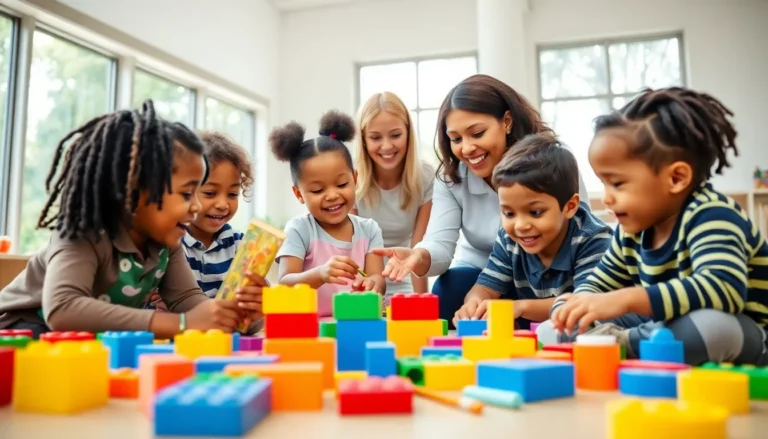Table of Contents
ToggleImagine navigating the complex world of child development without a map. That’s where a child development class comes in, a guided journey through the fascinating stages of growth, learning, and emotional development. Whether you’re a parent hoping to understand your little Einstein better, or someone just curious about what makes kids tick, these classes offer priceless insights. Plus, it’s a fantastic conversation starter at family gatherings. So, buckle up as we jump into what these classes entail and why they might just be the key to unlocking future potential.
Overview of Child Development Classes

Child development classes are designed to provide an in-depth understanding of how children grow and learn from infancy through adolescence. Typically offered at community colleges, universities, or online platforms, these classes cover various topics ranging from physical development and cognitive growth to social interactions. The curriculum is often tailored for various audiences such as parents, future educators, and childcare professionals. By engaging in discussions and practical assignments, students can apply theoretical knowledge to real-world scenarios, making the learning process dynamic and impactful.
Importance of Child Development Education
Understanding child development is crucial for anyone involved in a child’s life. This education fosters empathy and insight into how a child’s mind operates. The importance cannot be overstated. Child development education equips individuals with the skills to create supportive environments that nurture growth. Plus, it enables parents to address common developmental milestones effectively and helps educators tailor their teaching methods to suit developmental stages. Overall, this education lays the foundation for healthier, happier childhoods, which contribute to society as a whole.
Key Concepts Covered in Child Development Classes
Child development classes explore a multitude of essential concepts that are vital for anyone working with children.
Types of Child Development Classes
These classes may vary greatly. Some focus specifically on early childhood, while others investigate into adolescence. Each class provides specific insights and techniques tailored to age groups, ensuring that the material is relevant and applicable. Different programs might also cover psychosocial development, emotional growth, and even the impact of culture on child-rearing practices.
In-Person vs. Online Learning Options
With the rise of digital learning, prospective students now have the flexibility to choose between in-person and online classes. In-person classes offer the advantage of direct interaction, facilitating active participation and relationship building. Online classes, on the other hand, cater to busy schedules, allowing students to engage with the material at their own pace. Regardless of the format chosen, the essential concepts remain constant.
Career Opportunities with Child Development Knowledge
Knowledge of child development opens up various career paths. For instance, this field serves as a gateway to roles such as teachers, childcare workers, or therapists. Specializing in child development can also lead to positions in educational consulting or child psychology. Individuals can work with schools, nonprofits, or governmental agencies focused on child welfare. The skills acquired in these classes can be invaluable for anyone looking to make a difference in children’s lives. Eventually, the prospects are abundant and rewarding.
Benefits of Taking a Child Development Class
Taking a child development class offers numerous benefits, ranging from personal growth to career advancement.
First and foremost, individuals gain a better understanding of themselves as they reflect on their childhood experiences. Also, expectant parents or new caregivers can gain insightful perspectives on child development that usher in positive parenting practices. For professionals in the field, this education sharpens their skills, making them more effective at their jobs. Understandably, effective teaching could lead to better outcomes for children and families alike.
Also, engaging with peers in such classes fosters a rich community of shared experiences and win-win learning.
Finally, students leave with practical tools they can carry out immediately, enhancing interactions with children.



